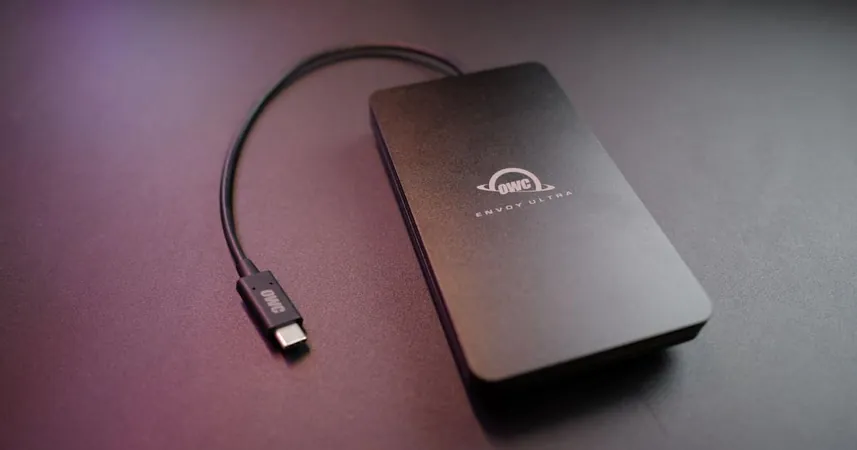
OWC Envoy Ultra Thunderbolt 5 SSD Review: A Powerful But Picky External Storage Solution
2025-03-31
Author: Jia
The OWC Envoy Ultra Thunderbolt 5 SSD has made waves as one of the rare external SSDs that truly harnesses the impressive data transfer capacities of Thunderbolt 5, claiming speeds of up to 80Gbps. As an early entrant in a market still adapting to Intel's latest high-speed technology, this external drive holds great promise for both power PC users and Apple aficionados who might be looking for alternatives to prohibitively expensive internal SSD upgrades.
Priced at $379.99 for the 2TB model and $549.99 for the 4TB version, the Envoy Ultra is not an impulsive purchase. Its robust construction is immediately noticeable—at around 250g, this SSD exudes durability with its sculpted aluminum casing. However, it’s essential to note that despite its sturdy appearance, the Envoy Ultra lacks an explicit IP rating for water or dust resistance.
One design aspect that raises eyebrows is the choice of a captive cable. While this prevents users from misplacing the Thunderbolt connection, it also restricts flexibility in cable management and raises concerns about long-term durability if the cable is stressed. For a $799 product, many would prefer detachable cables with robust, weatherproof connectors, ensuring better longevity and usability.
When it comes to performance, the Envoy Ultra does not disappoint. In various synthetic benchmarks like CrystalDiskMark, it achieved sequential read speeds of over 6GB/s—an impressive figure that positions it among the top external storage solutions. However, this testing is limited, as the Envoy Ultra is currently the only Thunderbolt 5 device available for comparison. For context, it was benchmarked against the internal M.2 NVMe Samsung 990 Pro SSD, revealing competitive yet not groundbreaking results.
Here's a quick comparison based on the benchmarks: CrystalDiskMark 8 Benchmark (in MB/s): - M.2 NVMe Samsung 990 Pro (Read / Write): 7,465 / 6,897 - Envoy Ultra Thunderbolt 5 SSD (Read / Write): 6068 / 5209
While these numbers indicate strong performance, the Envoy Ultra's compatibility could be a significant drawback for potential buyers. The theory of Thunderbolt 5's backwards compatibility does not always hold in practice. To maximize the drive's capabilities, users need systems equipped with the latest Intel Z890 chipset, as well as specific configurations for Apple devices—macOS 14 Sonoma or macOS 15 Sequoia. My experience with a Thunderbolt 4-equipped PC showed that the Envoy Ultra would not mount, leading to frustration and limited accessibility in Windows environments.
Additionally, the competitive market for external SSDs means potential buyers have many alternatives at significantly lower price points. For instance, Thunderbolt 3 or USB4 options are often available at around half the cost, complementing a broader range of devices without the stringent compatibility concerns.
However, when viewed against the extortionate costs of internal SSD upgrades from Apple—up to $1,200 for a 4TB upgrade—the Envoy Ultra does present a relatively affordable alternative for users in need of extreme performance.
It's also important to note that the internal SSD—Auro Pro IV—has been around since 2022 and may not match the cutting-edge technologies of newer SSDs on the market. This older model could constrict the Envoy Ultra's full potential, especially for demanding tasks like gaming or heavy content creation.
Ultimately, the OWC Envoy Ultra leaves a strong impression with its speed and build quality, but prospective buyers should approach with caution regarding compatibility, especially for those not utilizing top-tier PC components or Apple's latest devices. Aimed at a niche audience of professionals and enthusiasts who seek unrivaled speed, this SSD certainly makes a great case for itself. However, for users wanting versatility across various platforms or looking for cost-effective solutions, several simpler alternatives remain available. The Envoy Ultra is indeed a glimpse into the future of external storage, one that comes with its fair share of challenges.


 Brasil (PT)
Brasil (PT)
 Canada (EN)
Canada (EN)
 Chile (ES)
Chile (ES)
 Česko (CS)
Česko (CS)
 대한민국 (KO)
대한민국 (KO)
 España (ES)
España (ES)
 France (FR)
France (FR)
 Hong Kong (EN)
Hong Kong (EN)
 Italia (IT)
Italia (IT)
 日本 (JA)
日本 (JA)
 Magyarország (HU)
Magyarország (HU)
 Norge (NO)
Norge (NO)
 Polska (PL)
Polska (PL)
 Schweiz (DE)
Schweiz (DE)
 Singapore (EN)
Singapore (EN)
 Sverige (SV)
Sverige (SV)
 Suomi (FI)
Suomi (FI)
 Türkiye (TR)
Türkiye (TR)
 الإمارات العربية المتحدة (AR)
الإمارات العربية المتحدة (AR)